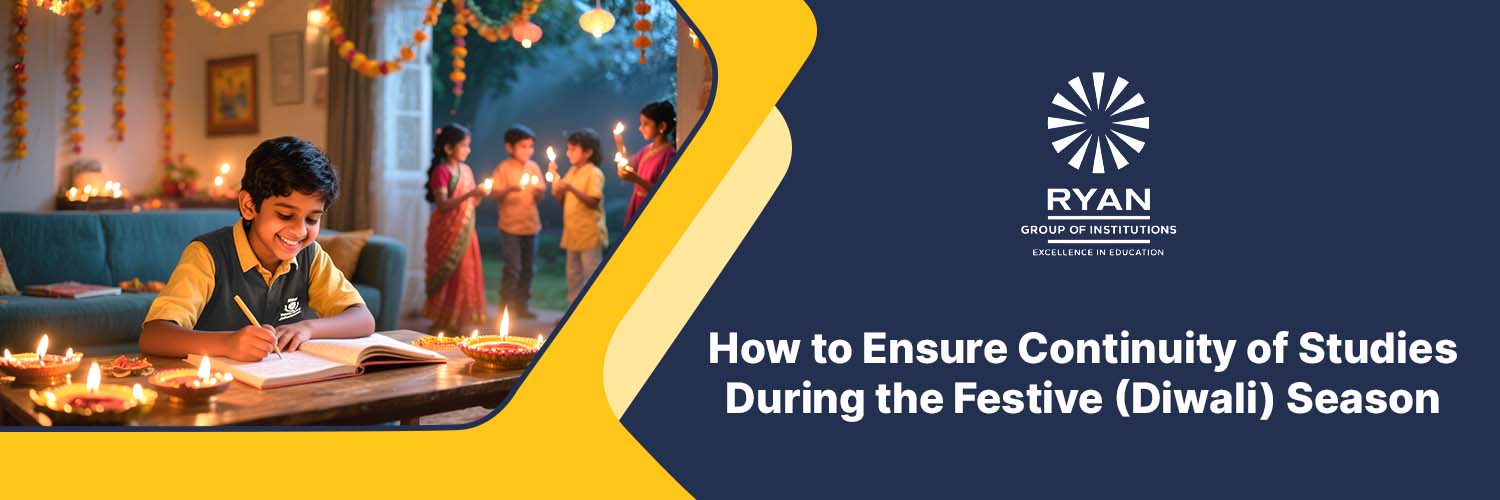
The festive season is on in India. The Navratri celebrations are just over, and Diwali—the festival of lights—is around the corner. People are busy shopping for new clothes, sweets, and decorating their houses. Both children and adults are in a celebration mode, where the daily routines take a back seat.
In this festive Hungama, children might easily lose continuity and momentum of their daily study and activity schedules. This might result in increased stress after the holidays and reduced subject recall.
This blog provides practical tips for parents to ensure continuity of their kids’ studies during the Diwali season—without missing the festive fun!
Most Indian families usually celebrate Diwali for a full week. The celebrations involve religious rituals, visiting friends and family, and entertaining guests at home during the week. Also, prior to the Diwali week, most families indulge in shopping and preparation of sweets and delicacies. In this situation, kids’ academic schedules will be disrupted with much lesser—and infrequent—study time, distracted attention, and too many non-academic activities. Adults also might not be able to sit with their kids to help them with their schoolwork.
The effects of this disruption in schedule will appear after the celebrations are over. The rhythm (or momentum) is very important for children to be able to excel in their academics, without feeling stressful. When the momentum is broken, it is hard for them to find it again quickly. This will cause unnecessary stress, difficulty in concentrating, and reduced recall of the topics they already learned.
However, children need fun too. All work and no play makes them dull. Also, festivals are a great opportunity for them to relax, build stronger bonds with family and friends, learn our culture, and develop a sense of community. Thus, it is very important to balance the celebrations and the academics in the right way.
Let’s jump right into the practical tips to achieve this.
Pick up a calendar and mark the days when study time will be limited. Use different colors to identify the days when no study will be possible and the days when limited study times will be possible. It is important to do this task along with your kids. Understand from them whether they are planning for any festival-related activity on these days.
During the limited study days, keep the study sessions short. Preferably 30-45 minutes sessions in the morning and evening. Make the most out of these sessions by making them focused sessions, where the child is already aware of the material to be learned in that session and all the notes are ready for them. We do not want to spend the time in identifying what to study! Work with your child to identify key topics that might be important for any exams following the festive season. Use the sessions to revise those topics.
You can be creative and integrate learning in festive situations. You can teach the concepts Mathematics such as shopping budget, discount calculation and measurements of ingredients for the delicacies you prepare, the basic chemistry behind fireworks, importance of eco-friendly celebrations etc. You can also encourage your children to write essays related to Diwali celebrations and gift them for it. These will help the children understand concepts by practically implementing them.
Kids can get easily distracted during long holidays and focus their attention on doomscrolling, video games, and binging on OTT. To avoid this, manage their screentime by setting limits and creating screen-free family moments. Help them avoid distractions by creating a distraction-free space for them at home, where they can focus on their work without any disturbance.
Children feel motivated by rewards. Teach them earn their fun by completing study-related goals. For example, offer to light diyas together if they complete a particular chapter on that day’s study session. Offer to prepare them their favourite sweet if they complete an assignment. Simple, yet rewarding, challenges like these will instill time management skills and discipline in kids.
Once the festival season is over, it is very important to build on the momentum that was only maintained during the holidays. It will require a completely different strategy.
As a final note, utilize this beautiful holiday season to not only help your kid learn their academic lessons but also some life lessons. Help them learn values such as empathy, respect and care towards elders, gratitude, patience, sharing, and care for mother earth.

